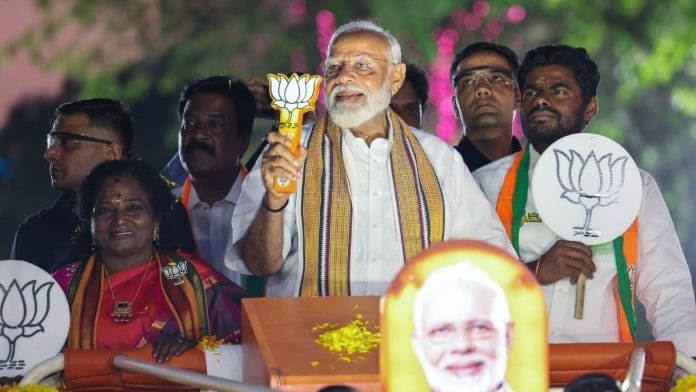Chennai: The BJP, which has been aggressively trying to gain a foothold in Tamil Nadu, has failed win any seats in the state, with the DMK alliance registering a clean sweep of all 39 constituencies. However, the BJP secured 10.69 percent of the votes—the highest for the party since it began contesting elections in Tamil Nadu.
Of the 23 constituencies it contested, BJP ended up second in nine—Coimbatore, Nilgiris, Chennai South, Chennai Central, Tirunelveli, Kanyakumari, Tiruvallur, Vellore, and Madurai. Additionally, BJP’s allies, the PMK and DMDK, secured second place in Dharmapuri and Virudhunagar constituencies, respectively.
Similarly ousted AIADMK leaders O Panneerselvam (OPS) and the AMMK’s TTV Dhinakaran, who fought with the backing of the BJP, also ended up second in Ramanthapuram and Theni respectively
The BJP’s improved vote-share, up from 3.66 percent in 2019, is largely attributed to the party state president K. Annamalai’s election strategy and could bode well for the 2026 assembly polls, according to political analysts,
“Though BJP has not won any seats, the increase in the vote share has created an impression that there is reception for BJP among the Tamil Nadu voters. This perspective is what BJP needed to be able to contest the 2026 assembly election on its own,” said political analyst Raveendran Duraisamy.
He also said that the vote banks of BJP’s alliance partners, including the PMK and ex-AIADMK leaders OPS and Dhinakaran, have transferred to the party.
“Their broader alliance has helped BJP in a lot of constituencies,” he added.
Also Read: DMK alliance sweeps all 39 seats in Tamil Nadu, NDA comes second in 11
BJP’s push for Tamil Nadu
The BJP had been preparing for the Lok Sabha polls since at least March 2023, with Prime Minister Narendra Modi visiting the state at least six times before the announcement of the elections. He had also visited twice after the announcement to campaign for the party’s candidates and alliance partners.
Even after the polling in Tamil Nadu ended, the prime minister took another trip to meditate at the Vivekananda Rock Memorial in Kanyakumari between 30 May and 1 June.
Apart from the PM, BJP top brass, including JP Nadda, Amit Shah and Rajnath Singh, also visited Tamil Nadu to campaign for NDA candidates.
During the campaign, the BJP’s state unit made multiple attempts to wipe off the party’s ‘outsider’ image by invoking the legacies of Tamil stalwarts like former chief ministers MG Ramachandran and J. Jayalalithaa and even Congress’s K. Kamaraj.
A long slog for BJP
Although a handful of BJP candidates have been contesting from their strongholds in Tamil Nadu, including Coimbatore and Kanyakumari, since 1989, the party first emerged as a serious contender in the state after it joined hands with the Dravidian major AIADMK in 1998.
In that Lok Sabha election, the BJP contested five seats and won three—Coimbatore, Nilgiris, and Trichy—securing 6.86 percent of votes. Subsequently, Rangarajan Kumaramangalam, who won from the Tiruchirappalli constituency, was given a berth in the cabinet, making him the party’s first Union minister from Tamil Nadu.
In the 1999 Lok Sabha elections, BJP joined hands with the DMK and contested in six constituencies, winning four, with a vote share of 7.14 percent.
However, BJP could not sustain their winning streak in 2004, despite being in an alliance with the AIADMK. The party had contested six seats again and lost all of them, with its vote share falling to 5.07 percent.
Then in 2009, for the first time, the BJP tested the political waters in the state, and went ahead without an alliance with either of the two Dravidian majors. The experiment was a failure and it ended up losing in all the constituencies, including its traditional strongholds Coimbatore and Kanyakumari. The party’s vote share fell further to 3.66 percent.
When former Union Minister Pon Radhakrishnan was elected as the president of the BJP’s Tamil Nadu unit in 2009, he vowed to strengthen the party’s position. This commitment came after the party had faced defeat in three consecutive polls—two parliamentary and one assembly.
In the 2014 Lok Sabha polls, Radhakrishnan led a broader alliance, similar to the one formed during the 2024 Lok Sabha polls. Actor-turned-politician Vijayakant’s Desiya Murpokku Dravida Kazhagam, Pattali Makkal Katchi led by S. Ramadoss, Vaiko’s Marumalarchi Dravida Munnetra Kazhagam, and other smaller parties, which held strong positions in their respective constituencies, were part of the NDA led by the BJP in 2014.
Despite putting up a strong fight, however, the BJP managed to win in only one constituency that election. The vote share of NDA was 18.80 percent, while BJP received 5.5 percent.
After the demise of AIADMK supremo J Jayalalithaa, the BJP forged an alliance with the party for the 2019 Lok Sabha polls and contested five seats, but lost in all. The AIADMK severed its ties with the BJP in September last year.
Also Read: How late Tamil Nadu CM K Kamaraj’s rhetoric came back to haunt Congress in PM Modi’s speech






